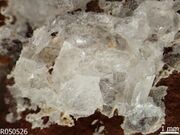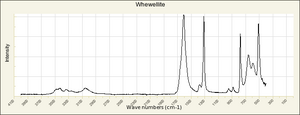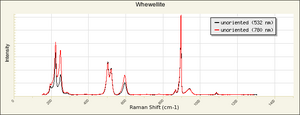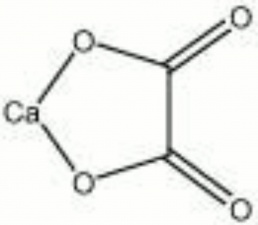Difference between revisions of "Whewellite"
Jump to navigation
Jump to search
| Line 9: | Line 9: | ||
[[[SliderGallery rightalign|Whewellite IR-ATR RRUFF R050526.png~IR-ATR (RRUFF)|Whewellite Raman RRUFF R050526.png~Raman (RRUFF)|whewellite.jpg~Chemical structure]]] | [[[SliderGallery rightalign|Whewellite IR-ATR RRUFF R050526.png~IR-ATR (RRUFF)|Whewellite Raman RRUFF R050526.png~Raman (RRUFF)|whewellite.jpg~Chemical structure]]] | ||
| − | |||
| − | |||
== Risks == | == Risks == | ||
Latest revision as of 12:13, 9 December 2022
Description
A white to colorless mineral composed of Calcium oxalate monohydrate. Whewellite is formed on the surface of Marble and Limestone due to the presence of microorganisms, such as Lichen.
Synonyms and Related Terms
calcium oxalate monohydrate; calcium salt of ethanedioic acid; wewelita (Esp.); whewelite (Port.); Whewellit (Deut.)
Risks
- Fisher Scientific: MSDS
Physical and Chemical Properties
- Soluble in dilute mineral acids. Insoluble in water, acetic acid.
- Slightly hygroscopic.
- Transparent to translucent tabular crystals with good cleavage in all three planes.
- Luster=vitreous to pearly.
- Streak = white.
- Fluorescent in UV light.
| Composition | Ca(C2O4)-H2O |
|---|---|
| CAS | 5794-28-5 |
| Mohs Hardness | 2.5-3.0 |
| Density | 2.2 g/ml |
| Molecular Weight | mol. wt. = 146.11 |
Resources and Citations
- Mineralogy Database: Whewellite
- M. del Monte, C. Sabbioni, G.Zappia. The origin of calcium oxalates on historical buildings, monuments and natural outcrops. The science of the total environment 67, (1987), pp. 17-39
- B. Ford, I.MacLeod, P.Haydock, "Rock art pigments from Kimberley region of Western Australia: identification of the minerals and conversion mechanisms." Studies in conservation 39, no. 1 (1994), pp. 57-69
- Random House, Webster's Encyclopedic Unabridged Dictionary of the English Language, Grammercy Book, New York, 1997
- Wikipedia,: http://en.wikipedia.org/wiki/Whewellite (Accessed Nov. 29, 2005)



